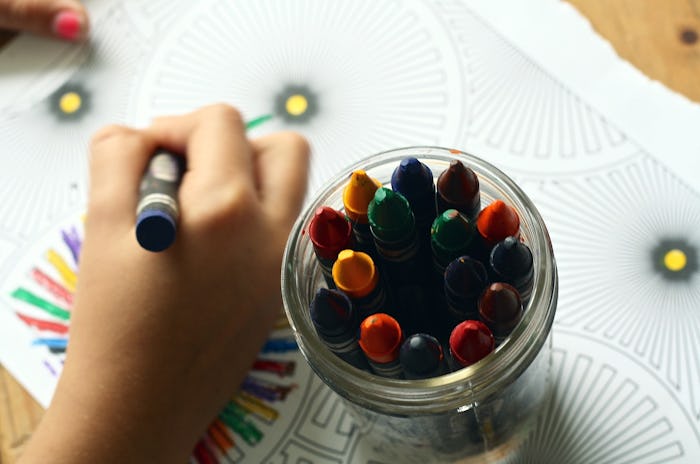When you're the parent of a baby, you often think about the kind of person that they'll become. Maybe they'll be super smart, with mathematical abilities that surpass your own. Maybe they'll be a star athlete, wowing the crowd with their athletic prowess. Or maybe they'll be creative. As they gets older, you may look for signs that help you figure out if your guess was correct. If you're hoping for an artist in the family, you need to know some of the early signs your kid will be creative.
Even if your kid isn't artistically talented, their creativity can help them in other ways and influence other parts of their life. According to an article on the Scholastic website, creativity is a process that can — and likely should — be fostered by caregivers and teachers alike. So even if your child doesn't seem like they're extremely creative on their own, you can still intentionally encourage the development of creativity while they're young. Some kids, however, show signs that they'll be independently creative as they grow up. If your child exhibits these seven signs, it could be an indication that your kid will be creative later on in life, as well.
1They Play Pretend
Lots of little kids play pretend, but if yours invents an imaginary world for herself, it could be a strong indicator that she'll be creative later in life. According to Scientific American, 2009 research found that kids who participate in imaginary play often grow into more creative adults. Although it may or may not be true for your child, the researchers found that it was, "one of the only early predictors of later adult creativity."
2They Understand Spatial Reasoning
If your kid loves Legos, that might mean that they'll be more creative when they get older. According to a study by Vanderbilt University researchers and published in Psychological Science, if a child has good spatial reasoning skills by the age of 13, they'll likely be creative and innovative later on in life. Spatial reasoning skills allow a child to mentally work with 2D and 3D shapes, which could explain why they spend all day building intricate Lego creations.
3They're Always On The Move
Toddlers and kindergarteners are often busy. According to Baby Center, if your child struggles to stay still, they might be a physical learner, which could cause them to choose a career that lets them express their creativity physically, rather than sit behind a desk all day. Dancing, theater, and cooking all fall under this category.
4They Use Divergent Thinking
Divergent thinking, according to Parenting, is a two-step process that encourages a kid to draw on knowledge they already have and apply it in a new way. This type of thinking can indicate that your child is going to be creative — or already is — when they get older. It doesn't have to be used to only solve large problems, if your child exhibits signs of divergent thinking, they're creatively solving problems.
5They Get Lost In The Moment
According to Parents, younger kids who enjoy the process of creating more than the product can actually be more creative when it comes to confronting challenges in other parts of their lives too. Creative problem solving is a skill that can help you throughout your life. It can be frustrating to let a kid meander through the process and not rush to focus on the finished result, but it might be worth it.
6They See Endless Choices
According to the aforementioned article from Parenting, kids who see choices everywhere — whether on their own or because they're presented with choices from parents and teachers — tend to be more creative, partially because they're allowed to be. They can choose to learn and explore the world around them in ways different than just what's been done before.
7They Make Their Own Rules
Creative kids make their own rules instead of following a set of pre-existing ones. According to a study published in The Journal of Creative Behavior, kids that lived primarily according to their own rules, rather than someone else's strict set, were more likely to be creative when they got older. You may not want to let your child decide everything for themselves, but giving them the freedom to dictate some of their own rules can help encourage them to be more creative down the road.
